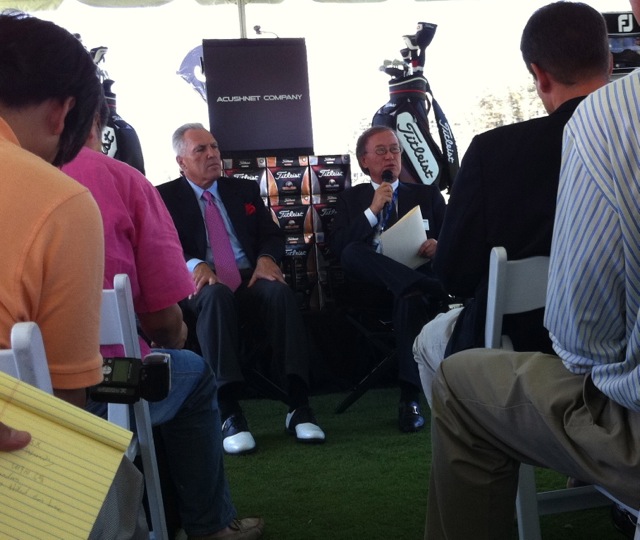Acushnet CEO Sounds Open To Bifurcation
/ Wednesday's press conference to launch the new era of Acushnet (Titleist, Footjoy) that is now backed by a consortium of Korean investors kicked off with a press conference. Set at the Bay Club near the company headquarters in Fairhaven, the event was co-hosted by longtime CEO Wally Uihlein and new Chairman Gene Yoon. There was the inevitable talk of value propositions, growth, stability, continuing ball manufacturing in America and plans to continue the traditions of golf's most historic brand.
Wednesday's press conference to launch the new era of Acushnet (Titleist, Footjoy) that is now backed by a consortium of Korean investors kicked off with a press conference. Set at the Bay Club near the company headquarters in Fairhaven, the event was co-hosted by longtime CEO Wally Uihlein and new Chairman Gene Yoon. There was the inevitable talk of value propositions, growth, stability, continuing ball manufacturing in America and plans to continue the traditions of golf's most historic brand.
While a number of interesting observations by my fellow writers will be shared about the mood (light-hearted thanks to Chairman Yoon's dry wit), the apparent future stability of the company (at least for now), and the first rate quality of the pasta salad served at lunch (delicious heirloom tomatoes), there was one absolute standout moment for observers of the company and its enormous influence on matters related to equipment regulation.
Asked by Golf Digest's Mike Stachura about the company stance on USGA/R&A regulation and any potential future bifurcation of the rules for professionals and amateurs, CEO Uihlein did not sound like the same man who has sounded opposed in past statements to any such notion. ("We have never supported the position of bifurcation.")
While a full transcript of the comments will hopefully arrive tomorrow, he did speak of Acushnet's hoped-for continued "good relationship with the ruling bodies" and that he "could make an argument for or against bifurcation."
Uihlein was emphatic that Acushnet was interested in letting "the ruling bodies make the rules" because "compared to twenty years ago," he sees "a 180 degree improvement" in the relationship between manufacturers and rulemakers.
Uihlein believes it is the job of the "ruling bodies to define the issues" and for manufacturers to "provide the tension" to counter, question or support the governing body view of those issues.
Cynics will suggest that Uihlein might be reflecting a new attitude of the company owners or someone who just spent the last six months listening to clueless Wall Street goons telling him what a lousy job he's done, but I don't sense the new owners know the game well enough to understand the issue nor do I sense Uihlein has lost any of his perspective about what will best sell his company product. Instead, I'm going to speculate and suggest that Uihlein's stance has been softened by a confluence of factors ranging from the bifurcation brought on by the groove rule change (not a big deal) to potential for bifurcation to actually grow his business while doing the right thing for the health and interest of the elite level.
Either way, the idea that the most influential manufacturer and most strident opponent to bifurcation is now open to arguments for a split in the rules could free up the game's leaders to make subtle rule changes that restore elements of skill. Handled properly, such a shift could also free up manufacturers to deliver those more innovative clubs to golfers who want them. It's a potential paradigm shift that could have huge ramifications for the health and future well-being of the sport.











